2020年高考英语全国卷3含答案
- 格式:docx
- 大小:86.37 KB
- 文档页数:14

绝密★启用前2020年高考英语冲刺卷全国卷(三)注意事项:1、答题前填写好自己的姓名、班级、考号等信息 2、请将答案正确填写在答题卡上1.Yourcreativityandideascanhelpotherteachers.Submityourartlessonplanoractivitytoday.Don’tforgettoincludeadditionalresourcedocumentsoraphoto.WetChalkPaintingGrades:K-4thLessonPlanObjectives:Developmentoffinemotorskills(协调性)andcreativelyexpressingthechild’sideasandthoughtsbyanewmedium.MaterialsNeeded:Coloredchalk,water,drawingpaper,sponge,andnewspapers.LessonProcedure:Dipthecoloredchalkintowateranddrawonthepaper.Anotherwayistoputthedra wingpaperonnewspapers,dampenitwithawetsponge,andthendraw.Submittedby:JackSidewalkDrawingGrades:K-5thLessonPlanObjectives:Developmentofthecreativeprocessbydoingartisticdrawingsinanewway anddevelopmentoffineandgrossmotorskills(全身协调性).MaterialsNeeded:Sidewalkoroutdoorchalkandlotsofsidewalk.LessonProcedure:Givethechildrenthechalkandletthemdrawwhatevertheychooseonthesidewal k.Youmayalsoconsiderusingthisinteachingsomeotherlessons(i.e.science).Submittedby:PeterRose一ColoredLorgnetteGrades:AnyMaterialsNeeded:Halfaneggcarton(包装盒),scissors,glue,coloredpaper,scotchtape(通明胶带),andaseveninchstick.LessonPlanObjectives:Childwillconstructanobjectthatallowsthemtoviewtheworldinavarietyof colorsandwilllearnwhycertainobjectsintheircoloredenvironmentlookthewaytheydowhencertaincolo rsaremixed.LessonPlanProcedure:Cutwindowsinthebumpsofhalfaneggcarton.Gluecirclesofcoloredcellop haneoverthewindowswithrubbercement.Tapeonastickforaholder.Submittedby:Jennifer1.WhichartlessonplanispresentedbyJennifer?A.WetChalkPainting.B.SidewalkDrawing.C.Rose-ColoredLorgnette.D.RainbowFan.2.WhatcommonmaterialdoesWetChalkPaintingandSidewalkDrawingrequire?A.Scissors.B.Chalk.C.Stick.D.Sponge.3.Rose-ColoredLorgnetteisaimedat___________.A.encouragingthechildtopaintatwillB.developingthechild’smotorskillsC.expressingthechild’sideasandthoughtsD.betteringthechild’sunderstandingofcolors2. Iheldmybreath,tryingnottosighoutloud.Myseventeen-year-oldsonArthurandIwereleavingaholid ayworkfunctionandtherewasplentyofleftoverfoodthattheorganizersweretryingtogiveaway.Immediat elyArthurhonedinonalargedishoftiramisuthatnooneelsewanted.Itwasenoughdessertforfourpeople,an dArthur’sdoctorhadwarnedusaboutwatchinghissugarintake.“Please,Gwen?Please?”Ithadbeenalongday,andeventhoughArthurtendstogetexhaustedbysocialsituationsthatarenotpartofh isregularroutine,heaccompaniedmetothedinnerandcharminglychattedwithmycolleaguesuntilitwasti metogohome.Thetiramisu,Ireasoned,washisreward.Aswelefttherestaurant,Arthurstoppednexttoourcartolookatsomething.Standingaboutfivefeetawaywasagentlemanwithhiswornjacket,stompinghisfeetandrubbinghishand stogetherinanattempttowardoffthecold.Everyfewsecondshesmiledandtriedtospeaktothepeoplewho werewalkingbywithoutpayinghimanyattention.Atthatmoment,thegentlemanspottedmysonwatching him.“Heyman,doyouhappentohaveanysparechange?”Arthurcheckedhisemptypocketsandthenlookedatmebriefly. Ishookmyhead.Arthurfrownedandthe nhesaidsomethingthattookmybreathaway."No,Idon't.Butareyouhungry?Doyouliketiramisu?Here,youcanhavemine.Ittasteslike...”I blinkedbacktearsasIwatchedtheman’ssmilebroadenevenmoreinappreciationbecauseIknewhisjoy wasn’tabouttiramisu.Mysondidn’tjustgivethefoodandwalkaway.Heengagedthemaninconversation, perhapsthefirstonethisgentlemanhadallday.Hetreatedthemanasaperson,withrespect.Thesmileonthe man'sfacetoldmethiswastherealreasonforhishappiness.Peoplewithautismdefinitelyhavefeelingsandemotions.Autisticscanandmostdefinitelyareempatheti ctoothers’feelingseveniftheydon’tknowhowtoexpressit.Beingkinddoesn’thavetobedifficultorcompl ex.1.WecaninferthatArthurbeggedhismomtoallowhim _______.A.togiveawaytheleftoverfoodB.toattendaholidayworkfunctionC.tochatwithhercolleaguesD.toeatabigtiramisu2.WhatmadeArthurfrown?A.Thewriterdidn'thaveanysparechange.B.Themanaskedhimforhistiramisu.C.Hefeltcoldwalkingpasttheparkinglot.D.Nobodypaidhimanyattention.3.Accordingtothewriter,thegentlemanwashappybecause __________.A.hegotsomethingdelicioustoeatB.hewastreatedwithrespectbyArthurC.hehadsomethingtotalkwithArthurD.hegotsomesparechangefromArthur4.WhatlessondidthewriterlearnfromArthur?A.Peoplewithautismvaluelogicoveremotion.B.Autisticpeoplefeelpainfuleasily.C.Peoplewithautismhavefeelings.D.Kindnesshastobecomplex.3.OnNovember10,nineminicheetahrobots,builtbyresearchersattheMIT,controlledbytheirhumancrea tors,showedtheirsuperiorathleticabilities.Thefour-leggedmachinesbeganwithawarm-uprunacrossthe field.Theythentookturnsplayingwithasoccerball.Asoftenhappensingames,acoupleoftheteammembe rsgotintoafightandpushedeachotheruntilbothfellontotheirbacks.Fortunately,theymadeupandendedth eirperformancewithaperfectbackflip(后滚翻),onethatwouldmakeevenaworld-classgymnastproud! Thoughtheserobotsresembletheirpredecessors,theCheetah3,theyaremuchlighter,weighingjust20pou nds.Andtheycanbendandswingtheirlegswide,givingthemtheabilitytowalkeitherright-side-uporupsid edown.Theycanalsowalkatabouttwicethespeedofanaverageperson'swalkingpace.Themachinescanal soquicklyrightthemselvesifkickedtothegroundandperform360-degreebackflipsfromastandingpositi on.UnliketheCheetah3,theminirobotsarebuiltusingcheap,easytofindparts.Thismeansthatifalegormotorb reaks,itcanbeeasilyreplacedusingoff-shelfparts."IfyouwanttochangesomethinginCheetah3,youhavet odoatonofredesign,"saysleaddeveloperBenjaminKatz.Theteam,whichhastenofthefour-leggedmachines,planstobuildadditionalunitsandlendthemtootherun iversityroboticlabs.Hebelievesthiswillenableotherengineerstoteachtherobotsdifferentskills."Eventu ally,I'mhopingwecouldhavearoboticdogracethroughanobstacle(障碍)course,whereeachteamcontrolsaminicheetahwithdifferentmethods,andwecanseewhichmethodis moreeffective,"Katzsays.TheMITteam'sreasonfordevelopingtherobotsisnotjustforentertainment.Theyhopethatsomedaypacks of"cheetahs"willassistfirstresponderswithsearchandrecoverytasksfollowingnaturaldisastersandwor kalongsidefirefighters.1.Whatismainlytalkedaboutinparagraph1?A.Afiercematchbetweenminirobots.B.Minirobots'soccerandgymnasticskills.C.Assessmentofminirobots'newfunctions.D.Similaritiesbetweenrobotsandhumanathletes.2.Whatcanminicheetahrobotsdo?A.Theycanwalkontheirheads.B.Theycancorrecttheirmistakes.C.Theycanbackflipevenwhenlying.D.Theycanplaysoccerballwithhumans.3.HowdotheminirobotsdifferfromtheCheetah3?A.Theircostislower.B.Theycanruntwicefaster.C.Theirappearanceischanged.D.They'rebetterreceivedbycustomers.4.WhydoesKatzwanttohavearoboticclograce?A.Toentertainpeople.B.Topromoteroboticresearch.C.Toteachrobotsdifferentskills.D.Toselectrobotsforrescuework.4.Arecenttroublingstudyshowedthat"fakenews"spreadsignificantlyfaster,deeperandmorebroadlytha nthetruth,withtheeffectevenmorepronouncedwhenregardingpoliticalnewsasopposedtoreportingonn aturaldisasters,financeorscience.Sohowcanweencourageindividualstoseekaccurateonlinecontent?L eadingscholarsaretryinghardtodealwiththisquestion. Processingnewinformationrequiresaconsiderablementaleffort,especiallywhenthatinformationconfli ctswithyourexistingworldview.Ittakesvulnerability(易伤性)andthewillingnesstoadmityoumaybewrong.Butwithagreatamountofconflictinginformationavaila ble,who'stosaywhat'sactuallytrueandwhat'sfalse?Ifyoucan'ttell,whynotjustmakelifeeasyandgowith whatsupportsyourcurrentbeliefs?Sowhatoptionsdowehave?Manysuggestthataddressingtheissuebyreformingadultbehaviorisaimingto ofarfromthesource.Analternativesolutionisusingearlyeducationtohelpindividualsrecognizethesepro blemsandapplycritical(批评的)thinkingtotheinformationtheyconsume.Currently,thereisapushintheUStoincludeInternetinformat ionclassesintoprimaryandsecondaryschoolcurriculums.Themovement,whichhasreceivedsomesupp ort,aimstomakefact-checkingseemlikesecondnaturetoindividualsatanearlyage.Primaryandsecondaryschoolaresupposedtobesupplyingstudentswiththeskillstheyneedtodevelopinto productive,informedmembersofoursociety.Asoursocietydevelops,thecurriculumweareteachingours tudentsneedtodevelopaswell.Weneedtogofurtherandalsoinstructouryouthononlineinformationlitera cy(识读).TheInternetisanamazingtool,buttouseitmosteffectivelywehavetoacceptitsbenefitswhilealsoundersta ndingthewaysinwhichitmakesusvulnerable.Ifstudentsarestilllearningdatedpracticessuchaswritingin school,shouldn'ttheybelearninghowtoconsumetheInternetresponsiblyaswell?1.Whatmakesitdifficulttodistinguishfakefromrealnews?A.Theconstantchangeincurrentbeliefs.B.Theinfluenceofdifferentexperts'beliefs.C.Theeasyandpeacefullifeofmodempeople.D.Thelargeamountofconflictinginformation.2.WhatdocurrentInternetinformationclassesfocuson?A.Buildingstrongbeliefsinstudents.B.Inspiringhumannatureinstudents.C.Developingstudents'criticalthinking.D.TeachingthebasicsofInternetinformation.3.Whyshouldwemakechangestostudents'curriculums?A.Toreformtraditionalwaysofeducation.B.Toseeknewapproachestoearlyeducation.C.Tomakeadjustmentsforfuturedevelopment.D.Tomakeroomforindividualizeddevelopment.4.Whichofthefollowingcanbeasuitabletitleforthetext?A.WeShouldTeachMediaLiteracyinSchoolB.SchoolEducationRequiresEvolutionC.SeekAccurateOnlineContentEarlyD.FakeNewsIsontheRise5.根据短文内容,从短文后的选项中选出能填入空白处的最佳选项。
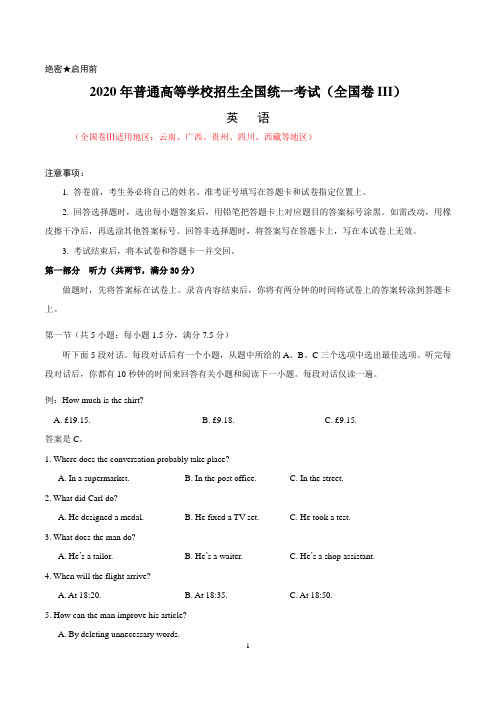
绝密★启用前2020年普通高等学校招生全国统一考试(全国卷III)英语(全国卷Ⅲ适用地区:云南、广西、贵州、四川、西藏等地区)注意事项:1. 答卷前,考生务必将自己的姓名、准考证号填写在答题卡和试卷指定位置上。
2. 回答选择题时,选出每小题答案后,用铅笔把答题卡上对应题目的答案标号涂黑。
如需改动,用橡皮擦干净后,再选涂其他答案标号。
回答非选择题时,将答案写在答题卡上,写在本试卷上无效。
3. 考试结束后,将本试卷和答题卡一并交回。
第一部分听力(共两节,满分30分)做题时,先将答案标在试卷上。
录音内容结束后,你将有两分钟的时间将试卷上的答案转涂到答题卡上。
第一节(共5小题;每小题1.5分,满分7.5分)听下面5段对话。
每段对话后有一个小题,从题中所给的A、B、C三个选项中选出最佳选项。
听完每段对话后,你都有10秒钟的时间来回答有关小题和阅读下一小题。
每段对话仅读一遍。
例:How much is the shirt?A. £19.15.B. £9.18.C. £9.15.答案是C。
1. Where does the conversation probably take place?A. In a supermarket.B. In the post office.C. In the street.2. What did Carl do?A. He designed a medal.B. He fixed a TV set.C. He took a test.3. What does the man do?A. He’s a tailor.B. He’s a waiter.C. He’s a shop assistant.4. When will the flight arrive?A. At 18:20.B. At 18:35.C. At 18:50.5. How can the man improve his article?A. By deleting unnecessary words.B. By adding a couple of points.C. By correcting grammar mistakes.第二节(共15小题;每小题1.5分,满分22.5分)听下面5段对话或独白。

2020年普通高等学校招生全国统一考试(全国卷I)英语注意事项:1.答卷前,考生务必将自己的姓名、准考证号填写在答题卡和试卷指定位置上。
2.回答选择题时,选出每小题答案后,用铅笔把答题卡上对应题目的答案标号涂黑。
如需改动,用橡皮擦干净后,再选涂其他答案标号。
回答非选择题时,将答案写在答题卡上,写在本试卷上无效。
3.考试结束后,将本试卷和答题卡一并交回。
第一部分听力(共两节,满分30分)做题时,先将答案标在试卷上。
录音内容结束后,你将有两分钟的时间将试卷上的答案转涂到答题卡上。
第一节(共5小题;每小题1.5分,满分7.5分)听下面5段对话。
每段对话后有一个小题,从题中所给的A、B、C三个选项中选出最佳选项。
听完每段对话后,你都有10秒钟的时间来回答有关小题和阅读下一小题。
每段对话仅读一遍。
例:How much is the shirt?A.£19.15.B.£9.18.C.£9.15.答案是C。
1.Where are the speakers?A.At a swimming pool.B.In a clothing shop.C.At a school lab.【答案】B【解析】【原文】本题为听力题,解析略。
2.What will Tom do next?A.Turn down the music.B.Postpone the show.C.Stop practicing.【答案】C【解析】【原文】本题为听力题,解析略。
3.What is the woman busy doing?A.Working on a paper.B.Tidying up the office.anizing a party.【答案】C【解析】【原文】本题为听力题,解析略。
4.When will Henry start his vacation?A.This weekend.B.Next week.C.At the end of August.【答案】A【解析】【原文】本题为听力题,解析略。

第一卷〔选择题共 115 分〕第一局部听力〔共两节,总分值 30 分〕答复听力局部时,请先将答案标在试卷上。
听力局部结束前,你将有两分钟的时间将您的答案转涂到客观答题卡上。
第一节〔共 5 小题:每题 1.5 分,总分值 7.5 分〕听下面 5 段对话,每段对话后有一个小题,从题中所给的 A、 B、C 三个选项选出最正确选项,并标在试卷的相应位置,听完每段对话后,你都有 10 秒钟的时间来答复有关小题和阅读下小题,每段对话仅读一遍。
例: How much is the shirt?A. £ 19.15.B. £ 9.18C. £ 9.15.答案是 C。
1. What does the man want to do?A. Take photos.B. Buy a cameraC. Help the woman2. What are the speakers talking about?A. A noisy nightB. Their life in townC. A place of living3. Where is the man now ?A. On his wayB. In a restaurantC. At home4. What will Celia do ?A. Find a playerB. Watch a gameC. Play basketball5. What day is it when the conversation takes place ?A. SaturdayB. SundayC. Monday第二节〔共 15 小题:每题 1.5 分,总分值 22.5 分〕听下面 5 段对话。
每段对话有几个小题,从题中所给的 A、 B、C 三个选项中选出的最正确选项,并标在试卷的相应位置。
听每段对话前,你将有时间阅读各个小题,每题 5 秒钟;听完后,各小题给出 5 秒钟的做答时间。

2020年高考全国卷Ⅲ英语(含答案)-CAL-FENGHAI-(2020YEAR-YICAI)_JINGBIAN绝密★启用前2020年普通高等学校招生全国统一考试(全国卷III)英语注意事项:1. 答卷前,考生务必将自己的姓名、准考证号填写在答题卡和试卷指定位置上。
2. 回答选择题时,选出每小题答案后,用铅笔把答题卡上对应题目的答案标号涂黑。
如需改动,用橡皮擦干净后,再选涂其他答案标号。
回答非选择题时,将答案写在答题卡上,写在本试卷上无效。
3. 考试结束后,将本试卷和答题卡一并交回。
第一部分听力(共两节,满分30分)做题时,先将答案标在试卷上。
录音内容结束后,你将有两分钟的时间将试卷上的答案转涂到答题卡上。
第一节(共5小题;每小题1.5分,满分7.5分)听下面5段对话。
每段对话后有一个小题,从题中所给的A、B、C三个选项中选出最佳选项。
听完每段对话后,你都有10秒钟的时间来回答有关小题和阅读下一小题。
每段对话仅读一遍。
例:How much is the shirtA. £19.15.B. £9.18.C. £9.15.答案是C。
1. Where does the conversation probably take place?A. In a supermarket.B. In the post office.C. In the street.2. What did Carl do?A. He designed a medal.B. He fixed a TV set.C. He took a test.3. What does the man do?A. He’s a tailor.B. He’s a waiter.C. He’s ashop assistant.4. When will the flight arrive?A. At 18:20.B. At 18:35.C. At18:50.5. How can the man improve his article?A. By deleting unnecessary words.B. By adding a couple of points.C. By correcting grammar mistakes.第二节(共15小题;每小题1.5分,满分22.5分)听下面5段对话或独白。
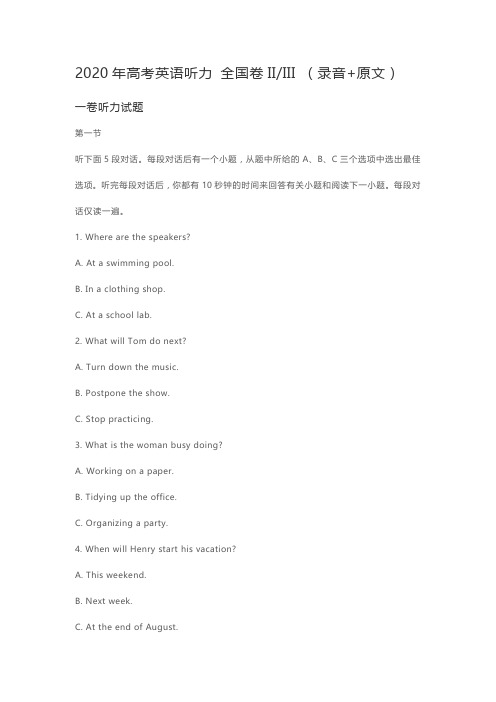
2020年高考英语听力全国卷II/III (录音+原文)一卷听力试题第一节听下面5段对话。
每段对话后有一个小题,从题中所给的A、B、C三个选项中选出最佳选项。
听完每段对话后,你都有10秒钟的时间来回答有关小题和阅读下一小题。
每段对话仅读一遍。
1. Where are the speakers?A. At a swimming pool.B. In a clothing shop.C. At a school lab.2. What will Tom do next?A. Turn down the music.B. Postpone the show.C. Stop practicing.3. What is the woman busy doing?A. Working on a paper.B. Tidying up the office.C. Organizing a party.4. When will Henry start his vacation?A. This weekend.B. Next week.C. At the end of August.5. What does Donna offer to do for Bill?A. Book a flight for him.B. Drive him to the airport.C. Help him park the car.第二节听下面5段对话或独白。
每段对话或独白后有几个小题,从题中所给的A、B、C三个选项中选出最佳选项。
听每段对话或独白前,你将有时间阅读各个小题,每小题5秒钟;听完后,各小题将给出5秒钟的作答时间。
每段对话或独白读两遍。
听第6段材料,回答第6、7题。
6. Why does Pete call Lucy?A. To say that he’ll be late.B. To tell her about his work.C. To invite her to dinner.7. When is Pete going to see Lucy?A. At 6:00pm.B. At 6:45pm.C. At 8:00pm.听第7段材料,回答第8至10题。

2020年高考英语全国卷Ⅲ语法填空试题及答案详解(全国卷Ⅲ适用地区:云南、广西、贵州、四川、西藏等地区)请看试题:第二节(共10小题;每小题1.5分,满分15分)阅读下面短文,在空白处填入1个适当的单词或括号内单词的正确形式。
In ancient China lived an artist. 61 paintings were almost lifelike. The artist’s reputation had made him proud. One day the emperor wanted to get his portrait (画像) done so he called all great artists to come and present their 62 (fine) work, so that he could choose the best. The artist was sure he would. 63 (choose), but when he presented his masterpiece to the emperor’s chief minister, the old nan laughed. The wise old man told him to travel to the Li River~perhaps he could learn a little from the greatest artist in the world.Filled with 64 (curious), the artist packed his bags and left. 65 he asked the villagers on the banks of the river where he could find the legendary (传奇的) artist, they smiled and 66 (point) down the river. The next morning he hired a boat and set out 67 (find) the well-known painter. As the small boat moved 68 (gentle) along the river he was left speechless by the mountains being silently reflected in the water. He passed milky white waterfalls and mountains in many shades of blue. And when he saw the mists rising from the river and the soft clouds 69 (surround) the mountain tops, he was reduced to tears. The artist was finally humbled (谦卑) by the greatest artist 70 earth, Mother Nature.请看译文:在古代中国有一位艺术家,他的画几乎栩栩如生。
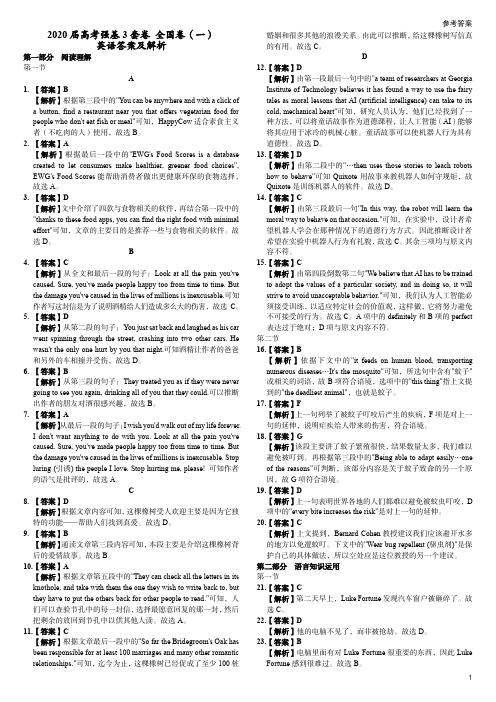
参考答案12020届高考强基3套卷 全国卷(一)英语答案及解析第一部分 阅读理解 第一节A1. 【答案】B【解析】根据第三段中的"You can be anywhere and with a click of a button, find a restaurant near you that offers vegetarian food for people who don't eat fish or meal"可知,HappyCow 适合素食主义者(不吃肉的人)使用,故选B 。
2. 【答案】A【解析】根据最后一段中的"EWG's Food Scores is a database created to let consumers make healthier, greener food choices", EWG's Food Scores 能帮助消费者做出更健康环保的食物选择,故选A 。
3. 【答案】D 【解析】文中介绍了四款与食物相关的软件,再结合第一段中的"thanks to these food apps, you can find the right food with minimal effort"可知,文章的主要目的是推荐一些与食物相关的软件。
故选D 。
B4. 【答案】C【解析】从全文和最后一段的句子:Look at all the pain you've caused. Sure, you've made people happy too from time to time. But the damage you've caused in the lives of millions is inexcusable.可知作者写这封信是为了说明酒精给人们造成多么大的伤害,故选C 。

英语试卷第1页(共28页)英语试卷第2页(共28页)绝密★启用前2020年普通高等学校招生全国统一考试·全国Ⅲ卷英语注意事项:1.答卷前,考生务必将自己的姓名、准考证号填写在答题卡和试卷指定位置上。
2.回答选择题时,选出每小题答案后,用铅笔把答题卡上对应题目的答案标号涂黑。
如需改动,用橡皮擦干净后,再选涂其他答案标号。
回答非选择题时,将答案写在答题卡上,写在本试卷上无效。
3.考试结束后,将本试卷和答题卡一并交回。
第一部分听力(共两节,满分30分)做题时,先将答案标在试卷上。
录音内容结束后,你将有两分钟的时间将试卷上的答案转涂到答题卡上。
第一节(共5小题;每小题1.5分,满分7.5分)听下面5段对话。
每段对话后有一个小题,从题中所给的A 、B 、C 三个选项中选出最佳选项。
听完每段对话后,你都有10秒钟的时间来回答有关小题和阅读下一小题。
每段对话仅读一遍。
例:How much is the shirt?A.£19.15.B.£9.18.C.£9.15.答案是C 。
1.Where does the conversation probably take place?A.In a supermarket. B.In the post office.C.In the street.2.What did Carl do?A.He designed a medal. B.He fixed a TV set. C.He took a test.3.What does the man do?A.He’s a tailor.B.He’s a waiter.C.He’s a shop assistant.4.When will the flight arrive?A.At 18:20.B.At 18:35.C.At 18:50.5.How can the man improve his article?A.By deleting unnecessary words.B.By adding a couple of points.C.By correcting grammar mistakes.第二节(共15小题;每小题1.5分,满分22.5分)听下面5段对话或独白。
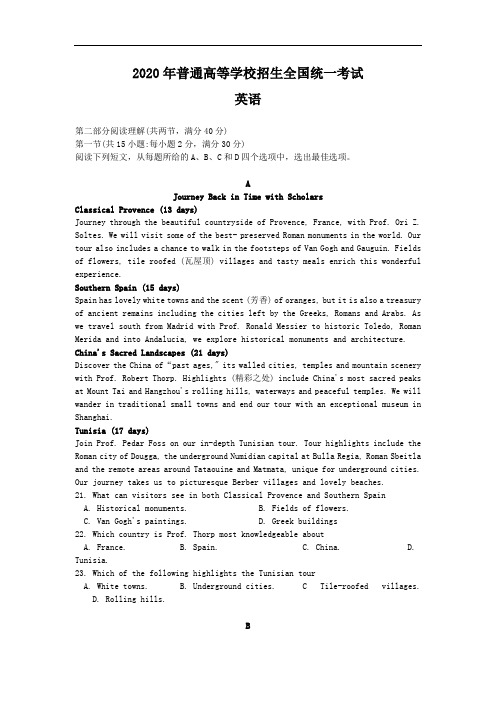
2020年普通高等学校招生全国统一考试英语第二部分阅读理解(共两节,满分40分)第一节(共15小题:每小题2分,满分30分)阅读下列短文,从每题所给的A、B、C和D四个选项中,选出最佳选项。
AJourney Back in Time with ScholarsClassical Provence (13 days)Journey through the beautiful countryside of Provence, France, with Prof. Ori Z. Soltes. We will visit some of the best- preserved Roman monuments in the world. Our tour also includes a chance to walk in the footsteps of Van Gogh and Gauguin. Fields of flowers, tile roofed (瓦屋顶) villages and tasty meals enrich this wonderful experience.Southern Spain (15 days)Spain has lovely white towns and the scent (芳香) of oranges, but it is also a treasury of ancient remains including the cities left by the Greeks, Romans and Arabs. As we travel south from Madrid with Prof. Ronald Messier to historic Toledo, Roman Merida and into Andalucia, we explore historical monuments and architecture. China's Sacred Landscapes (21 days)Discover the China of“past ages," its walled cities, temples and mountain scenery with Prof. Robert Thorp. Highlights (精彩之处) include China's most sacred peaks at Mount Tai and Hangzhou's rolling hills, waterways and peaceful temples. We will wander in traditional small towns and end our tour with an exceptional museum in Shanghai.Tunisia (17 days)Join Prof. Pedar Foss on our in-depth Tunisian tour. Tour highlights include the Roman city of Dougga, the underground Numidian capital at Bulla Regia, Roman Sbeitla and the remote areas around Tataouine and Matmata, unique for underground cities. Our journey takes us to picturesque Berber villages and lovely beaches.21. What can visitors see in both Classical Provence and Southern SpainA. Historical monuments.B. Fields of flowers.C. Van Gogh's paintings.D. Greek buildings22. Which country is Prof. Thorp most knowledgeable aboutA. France.B. Spain.C. China.D. Tunisia.23. Which of the following highlights the Tunisian tourA. White towns.B. Underground cities. C Tile-roofed villages.D. Rolling hills.BWhen “Rise of the Planet of the Ape s”was first shown to the public last month, a group of excited animal activists gathered on Hollywood Boulevard. But they weren't there to throw red paint on fur-coat- wearing film stars. Instead, one activist, dressed in a full-body monkey suit, had arrived with a sign praising the filmmakers: "Thanks for not using real apes (猿)!”The creative team behind “Apes”used motion-capture (动作捕捉) technology to create digitalized animals, spending tens of millions of dollars on technology that records an actor's performance and later processes it with computer graphics to create a final image (图像). In this case, one of a realistic-looking ape.Yet “Apes” is more exception than the rule. In fact, Hollywood has been hot on live animals lately. One nonprofit organization, which monitors the treatment of animals in filmed entertainment, is keeping tabs on more than 2,000 productions this year. Already, a number of films, including “Water for Elephants,”“The Hangover Part I” and “Zookeeper,” have drawn the anger of activists who say the creatures acting in them haven't been treated properly.In some cases, it's not so much the treatment of the animals on set in the studio that has activists worried; it's the off-set training and living conditions that are raising concerns. And there are questions about the films made outside the States, which sometimes are not monitored as closely as productions filmed in the States.24. Why did the animal activists gather on Hollywood BoulevardA. To see famous film stars.B. To oppose wearing fur coats.C. To raise money for animal protection.D. To express thanks to some filmmakers.25. What does paragraph 2 mainly talk aboutA. The cost of making “Apes.”B. The creation of digitalized apes.C. The publicity about “Apes.”D. The performance of real apes.26. What does the underlined phrase “keeping tabs on”in paragraph 3 probably meanA. Listing completely.B. Directing professionally.C. Promoting successfullyD. Watching carefully.27. What can we infer from the last paragraph about animal actorsA. They may be badly treated.B. They should take further training.C. They could be traded illegallyD. They would lose popularity.CWith the young unable to afford to leave home and the old at risk of isolation (孤独), more families are choosing to live together.The doorway to peace and quiet, for Nick Bright at least, leads straight to his mother-in-law: she lives on the ground floor, while he lives upstairs with his wife and their two daughters.Four years ago they all moved into a three-storey Victorian house in Bristol- one of a growing number of multigenerational families in the UK living together under the same roof. They share a front door and a washing machine, but Rita Whitehead has her own kitchen, bathroom, bedroom and living room on the ground floor.“We floated the idea to my mum of sharing a house,” says Kathryn Whitehead. Rita cuts in: “We spoke more with Nick because I think it's a big thing for Nick to live with his mother-in-law.”And what does Nick think “From my standpoint, it all seems to work very well. Would I recommend it Yes, I think I would.”It's hard to tell exactly how many people agree with him, but research indicates that the numbers have been rising for some time. Official reports suggest that the number of households with three generations living together had risen from 325,000 in 2001 to 419,000 in 2013.Other varieties of multigenerational family are more common. Some people live with their elderly parents; many more adult children are returning to the family home, if they ever left. It is said that about 20% of 25-34-year-olds live with their parents, compared with 16% in 1991. The total number of all multigenerational households in Britain is thought to be about million.Stories like that are more common in parts of the world, where multigenerational living is more firmly rooted. In India, particularly outside cities, young women are expected to move in with their husband's family when they get married.28. Who mainly uses the ground floor in the Victorian house in BristolA. Nick.B. Rita.C. Kathryn.D. The daughters.29. What is Nick's attitude towards sharing the house with his mother-in-lawA. Positive.B. Carefree.C. Tolerant.D. Unwilling.30. What is the author's statement about multigenerational family based onA. Family traditions.B. Financial reports.C. Published statistics.D. Public opinions.31. What is the text mainly aboutA. Lifestyles in different countries.B. Conflicts between generations.C. A housing problem in Britain.D. A rising trend of living in the UK.DWe are the products of evolution, and not just evolution that occurred billions of years ago. As scientists look deeper into our genes (基因), they are finding examples of human evolution in just the past few thousand years. People in Ethiopian highlands have adapted to living at high altitudes. Cattle -raising people in East Africa and northern Europe have gained a mutation (突变) that helps them digest milk as adults.On Thursday in an article published in Cell, a team of researchers reported a new kind of adaptation - not to air or to food, but to the ocean. A group of sea-dwelling people in Southeast Asia have evolved into better divers. The Bajau,as these people are known, number in the hundreds of thousands in Indonesia, Malaysia and the Philippines. They have traditionally lived on houseboats; in recent times, they've also built houses on stilts (支柱) in coastal waters. “They are simply a stranger to the land," said Redney C. Jubilado, a University of Hawaii researcher who studies the Bajau.Dr. Jubilado first met the Bajau while growing up on Samal Island in the Philippines. They made a living as divers, spearfishing or harvesting shellfish. "We were so amazed that they could stay underwater much longer than us local islanders," Dr. Jubilado said. “I could see them actually walking under the sea."In201, Melissa Ilardo, then a graduate student in genetics at the University of Copenhagen, heard about the Bajau. She wondered if centuries of diving could have led to the evolution of physical characteristics that made the task easier for them. “it seemed like the perfect chance for natural selection to act on a population," said Dr. Ilardo. She also said there were likely a number of other genes that help the Bajau dive.32. What does the author want to tell us by the examples in paragraph 1A. Environmental adaptation of cattle raisers.B. New knowledge of human evolution.C. Recent findings of human origin.D. Significance of food selection.33. Where do the Bajau build their housesA. In valleys.B. Near rivers.C. On the beach.D. Off the coast.34. Why was the young Jubilado astonished at the BajauA. They could walk on stilts all day.B. They had a superb way of fishing.C. They could stay long underwater.D. They lived on both land and water.35. What can be a suitable title for the textA. Bodies Remodeled for a Life at SeaB. Highlanders' Survival SkillsC. Basic Methods of Genetic ResearchD. The World's Best Divers第二节(共5小题: 每小题2分,满分10分)根据短文内容,从短文后的选项中选出能填入空白处的最佳选项。
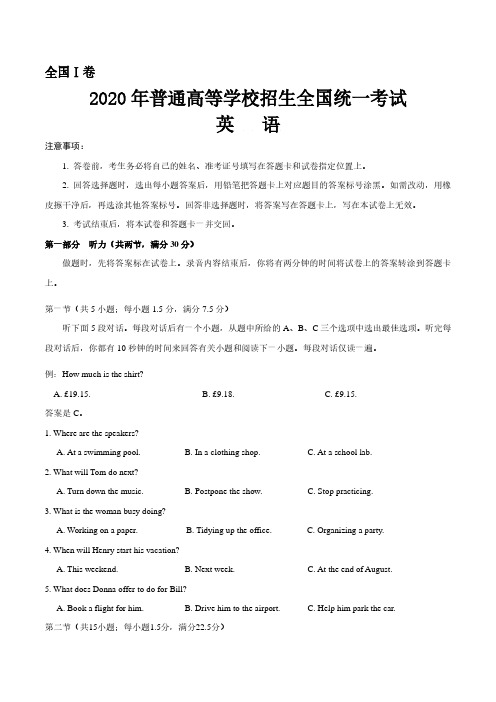
全国Ⅰ卷2020年普通高等学校招生全国统一考试英语注意事项:1. 答卷前,考生务必将自己的姓名、准考证号填写在答题卡和试卷指定位置上。
2. 回答选择题时,选出每小题答案后,用铅笔把答题卡上对应题目的答案标号涂黑。
如需改动,用橡皮擦干净后,再选涂其他答案标号。
回答非选择题时,将答案写在答题卡上,写在本试卷上无效。
3. 考试结束后,将本试卷和答题卡一并交回。
第一部分听力(共两节,满分30分)做题时,先将答案标在试卷上。
录音内容结束后,你将有两分钟的时间将试卷上的答案转涂到答题卡上。
第一节(共5小题;每小题1.5分,满分7.5分)听下面5段对话。
每段对话后有一个小题,从题中所给的A、B、C三个选项中选出最佳选项。
听完每段对话后,你都有10秒钟的时间来回答有关小题和阅读下一小题。
每段对话仅读一遍。
例:How much is the shirt?A. £19.15.B. £9.18.C. £9.15.答案是C。
1. Where are the speakers?A. At a swimming pool.B. In a clothing shop.C. At a school lab.2. What will Tom do next?A. Turn down the music.B. Postpone the show.C. Stop practicing.3. What is the woman busy doing?A. Working on a paper.B. Tidying up the office.C. Organizing a party.4. When will Henry start his vacation?A. This weekend.B. Next week.C. At the end of August.5. What does Donna offer to do for Bill?A. Book a flight for him.B. Drive him to the airport.C. Help him park the car.第二节(共15小题;每小题1.5分,满分22.5分)听下面5段对话或独白。

英语试卷 第1页(共28页)英语试卷 第2页(共28页)绝密★启用前2020年普通高等学校招生全国统一考试·全国Ⅲ卷英 语注意事项:1.答卷前,考生务必将自己的姓名、准考证号填写在答题卡和试卷指定位置上。
2.回答选择题时,选出每小题答案后,用铅笔把答题卡上对应题目的答案标号涂黑。
如需改动,用橡皮擦干净后,再选涂其他答案标号。
回答非选择题时,将答案写在答题卡上,写在本试卷上无效。
3.考试结束后,将本试卷和答题卡一并交回。
第一部分 听力(共两节,满分30分)做题时,先将答案标在试卷上。
录音内容结束后,你将有两分钟的时间将试卷上的答案转涂到答题卡上。
第一节(共5小题;每小题1.5分,满分7.5分)听下面5段对话。
每段对话后有一个小题,从题中所给的A 、B 、C 三个选项中选出最佳选项。
听完每段对话后,你都有10秒钟的时间来回答有关小题和阅读下一小题。
每段对话仅读一遍。
例:How much is the shirt?A. £19.15.B. £9.18.C. £9.15.答案是C 。
1. Where does the conversation probably take place? A. In a supermarket.B. In the post office.C. In the street.2. What did Carl do? A. He designed a medal. B. He fixed a TV set.C. He took a test.3. What does the man do? A. He’s a tailor.B. He’s a waiter.C. He’s a sho p assistant.4. When will the flight arrive? A. At 18:20.B. At 18:35.C. At 18:50.5. How can the man improve his article? A. By deleting unnecessary words.B. By adding a couple of points.C. By correcting grammar mistakes.第二节(共15小题;每小题1.5分,满分22.5分)听下面5段对话或独白。

2020高考英语试题及答案一、阅读理解部分1. 阅读理解1题目内容:根据短文内容,回答以下问题。
问题1:What did Jane do last weekend?问题答案:Jane went hiking with her parents last weekend.2. 阅读理解2题目内容:根据短文内容,判断以下句子的正误。
句子1:The weather was nice during the camping trip.答案:正确句子2:The campers saw some wild animals in the forest.答案:错误句子3:The camping trip lasted for two days.答案:错误二、完形填空部分题目内容:选择适当的单词或短语,填入空白处,使短文完整、通顺。
Jane and her brother Tom are going to their 1. aunt’s house for the summer vacation. They were very excited 2. their parents told them the news. They 3. their suitcases and said goodbye to their parents, then they left for their aunt’s house.On the way to their aunt’s house, they stopped at a restaurant for lunch. They were hungry 4. they had been traveling for a long time. After lunch, they continued their journey. Along the way, they saw many interesting things, such as beautiful mountains 5. rivers.Finally, they arrived at their aunt’s house. Their aunt was waiting for them at the 6.. She hugged them tight and welcomed them warmly. She prepared a delicious dinner for them. Jane and Tom 7. their aunt for the wonderful meal.The summer vacation at their aunt’s house was full of 8. . They went swimming in the nearby lake, visited the local 9., and made new friends. They also helped their aunt with some housework. They enjoyed every moment of their vacation.When it was time to go back home, Jane and Tom felt a little 10., but they promised their aunt that they would visit her again next summer.答案: 1. favorite 2. when 3. packed 4. because 5. and 6. gate 7. thanked 8. fun 9. museum 10. sad三、语法填空部分题目内容:根据句子意思,用括号中所给单词的适当形式填空。

2020年高考英语全国卷短文改错答案详解及考点分布规律总结一. 短文改错试题及答案详解(一) 2020年高考英语全国卷I 语法填空及答案详解(全国卷I 适用地区:安徽、湖北、福建、湖南、山西、河北、江西、广东、河南) 请看试题:第一节 短文改错(共10小题;每小题1分,满分10分)假定英语课上老师要求同桌之间交换修改作文,请你修改你同桌写的以下作文。
文中共有10处语言错误,每句中最多有两处。
每处错误仅涉及一个单词的增加、删除或修改。
增加:在缺词处加一个漏字符号(∧),并在其下面写出该加的词。
删除:把多余的词用斜线(\)划掉。
修改:在错的词下划一横线,并在该词下面写出修改后的词。
注意:1. 每处错误及其修改均仅限一词;2. 只允许修改10处,多者(从第11处起)不计分。
Today I tried cooking a simply dish myself. I like eating frying tomatoes with eggs, and I thought it must to be easy to cook. My mom told me how to preparing it. First I cut the tomatoes into pieces but put them aside. Next I broke the eggs into a bowl and beat them quickly with chopstick. After that I poured oil into a pan and turned off the stove. I waited patiently unless the oil was hot. Then I put the tomatoes and the beaten eggs into pan together. "Not that way ,"my mom tried to stop us but failed. She was right. It didn ’t tum out as I had wished.请看译文:今天我试着自己做了一道简单的菜。
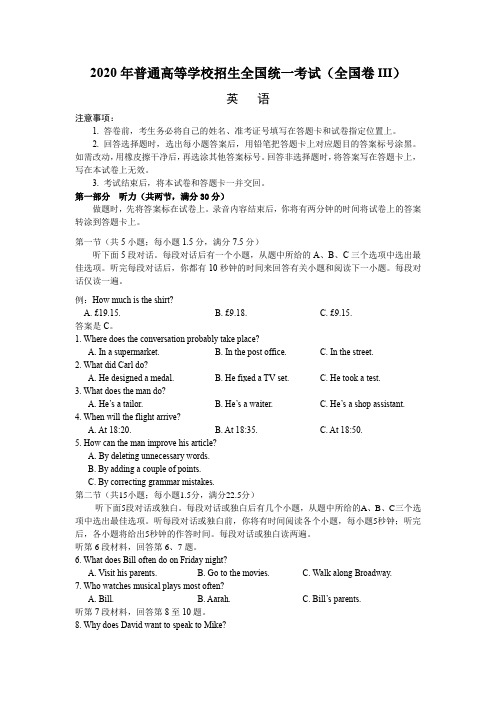
2020年普通高等学校招生全国统一考试(全国卷III)英语注意事项:1. 答卷前,考生务必将自己的姓名、准考证号填写在答题卡和试卷指定位置上。
2. 回答选择题时,选出每小题答案后,用铅笔把答题卡上对应题目的答案标号涂黑。
如需改动,用橡皮擦干净后,再选涂其他答案标号。
回答非选择题时,将答案写在答题卡上,写在本试卷上无效。
3. 考试结束后,将本试卷和答题卡一并交回。
第一部分听力(共两节,满分30分)做题时,先将答案标在试卷上。
录音内容结束后,你将有两分钟的时间将试卷上的答案转涂到答题卡上。
第一节(共5小题;每小题1.5分,满分7.5分)听下面5段对话。
每段对话后有一个小题,从题中所给的A、B、C三个选项中选出最佳选项。
听完每段对话后,你都有10秒钟的时间来回答有关小题和阅读下一小题。
每段对话仅读一遍。
例:How much is the shirt?A. £19.15.B. £9.18.C. £9.15.答案是C。
1. Where does the conversation probably take place?A. In a supermarket.B. In the post office.C. In the street.2. What did Carl do?A. He designed a medal.B. He fixed a TV set.C. He took a test.3. What does the man do?A. He’s a tailor.B. He’s a waiter.C. He’s a shop assistant.4. When will the flight arrive?A. At 18:20.B. At 18:35.C. At 18:50.5. How can the man improve his article?A. By deleting unnecessary words.B. By adding a couple of points.C. By correcting grammar mistakes.第二节(共15小题;每小题1.5分,满分22.5分)听下面5段对话或独白。

绝密★启用前2020年普通高等学校招生全国统一考试全国卷I英语注意事项:1、答卷前,考生务必将自己的姓名、准考证号填写在答题卡上:2、回答选择题时,选出每小题苦案后,用铅笔把答题卡上对应题目的答案标号涂黑,如需改动,用橡皮擦干净后,再选涂其他答案标号。
回答非选择题时,将答案写在答题卡上,写在本试卷上无效。
3.考试结束后,将本试卷和答题卡一并交回。
第一部分听力(共两节,满分30分)极超时,先将客案标在试卷上。
录音内容结束后,你将有两分钟的时间将试巷上的答案转涂到答题卡上。
一、听下面5段对话。
每段对话后有一个小题,从题中所给的A、B、C三个选项中选出最佳选项。
(共5小题;每小题1.5分,满分7.5分)(共5题;共7.5分)1.Where does the conversation probably take place?A. In a supermarket.B. In the post office.C. In the street.2.What did Carl do?A. He designed a medal.B. He fixed a TV set.C. He took a test.3.What does the man do?A. He's a tailor.B. He's a waiter.C. He's a shop assistant.4.When will the flight arrive?A. At 18:20.B. At 18:35.C. At 18:50.5.How can the man improve his article?A. By deleting unnecessary words.B. By adding a couple of points.C. By correcting grammar mistakes.二、听下面5段对话或独白。

2020年普通高等学校招生全国统一考试(全国卷I)英语第一部分听力(共两节,满分30分)第一节(共5小题;每小题1.5分,满分7.5分)听下面5段对话。
每段对话后有一个小题,从题中所给的A、B、C三个选项中选出最佳选项。
听完每段对话后,你都有10秒钟的时间来回答有关小题和阅读下一小题。
每段对话仅读一遍。
例:How much is the shirt?A. £19.15.答案是C o1.W here are the speakers?A. At a swimming pool.2.W hat will Tom do next?A.Turn down the music.B.£9.18.B.In a clothing shop.B. Postpone the show.C. £9.15.C. At a school lab.C.Stop practicing.3.What is the woman busy doing?A.Working on a paper.B.Tidying up the office.anizing a party.4.When will Henry start his vacation?A. This weekend.B. Next week.C. At the end of August.5.What does Donna offer to do for Bill?A. Book a flight for him.B. Drive him to the airport.C. Help him park the car.第二节(共15小题;每小题1.5分,满分22.5分)听第6段材料,回答第6、7题。
6.Why does Pete call Lucy?A. To say that he'll be late.B. To tell her about his work.7.When is Pete going to see Lucy?A. At 6:00 pm.B. At 6:45 pm.听第7段材料,回答第8至10题。
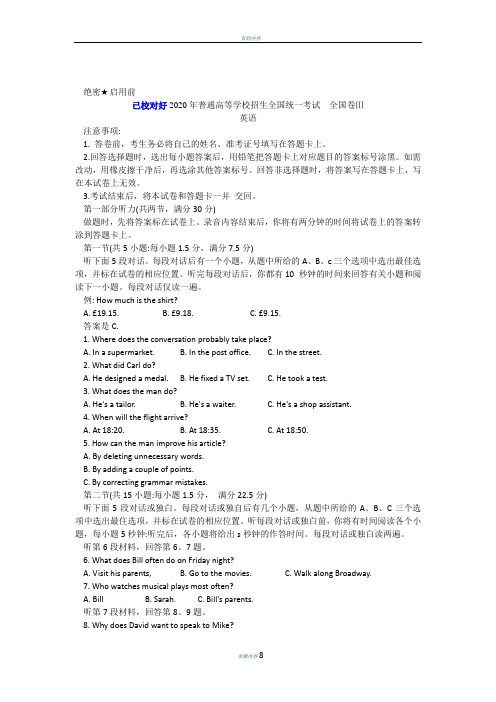
绝密★启用前已校对好2020年普通高等学校招生全国统一考试全国卷Ⅲ英语注意事项:1. 答卷前,考生务必将自己的姓名、准考证号填写在答题卡上。
2.回答选择题时,选出每小题答案后,用铅笔把答题卡上对应题目的答案标号涂黑。
如需改动,用橡皮擦干净后,再选涂其他答案标号。
回答非选择题时,将答案写在答题卡上,写在本试卷上无效。
3.考试结束后,将本试卷和答题卡一并交回。
第一部分听力(共两节,满分30分)做题时,先将答案标在试卷上。
录音内容结束后,你将有两分钟的时间将试卷上的答案转涂到答题卡上。
第一节(共5小题:每小题1.5分,满分7.5分)听下面5段对话。
每段对话后有一个小题,从题中所给的A、B、c三个选项中选出最佳选项,并标在试卷的相应位置。
听完每段对话后,你都有10 秒钟的时间来回答有关小题和阅读下一小题。
每段对话仅读一遍。
例: How much is the shirt?A. £19.15.B. £9.18.C. £9.15.答案是C.1. Where does the conversation probably take place?A. In a supermarket.B. In the post office.C. In the street.2. What did Carl do?A. He designed a medal.B. He fixed a TV set.C. He took a test.3. What does the man do?A. He's a tailor.B. He's a waiter.C. He's a shop assistant.4. When will the flight arrive?A. At 18:20.B. At 18:35.C. At 18:50.5. How can the man improve his article?A. By deleting unnecessary words.B. By adding a couple of points.C. By correcting grammar mistakes.第二节(共15小题:每小题1.5分,满分22.5分)听下面5段对话或独白。
英语试卷第1页(共28页)
英语试卷第2页(共28页)
------------在
---------------------此---------------------
卷---------------------
上---------------------
答---------------------
题---------------------
无--------------------
效
----------------
毕业学校_____________ 姓名________________ 考生号_______________ ________________ ___________
英语试卷第7页(共28页)英语试卷第8页(共28页)
英语试卷第1页(共28页)
英语试卷第2页(共28页)
------------在
---------------------此---------------------
卷
---------------------
上
---------------------
答
---------------------
题
---------------------
无
--------------------
效
----------------
毕业学校_____________ 姓名________________ 考生号_______________ ________________ ___________
英语试卷第7页(共28页)英语试卷第8页(共28页)
英语试卷第1页(共28页)
英语试卷第2页(共28页)
------------在
---------------------此---------------------
卷---------------------
上---------------------
答---------------------
题---------------------
无--------------------
效
----------------
毕业学校_____________ 姓名________________ 考生号_______________ ________________ ___________
英语试卷第7页(共28页)英语试卷第8页(共28页)
英语试卷第1页(共28页)英语试卷第2页(共28页)
英语试卷第7页(共28页)英语试卷第8页(共28页)
英语试卷第1页(共28页)英语试卷第2页(共28页)
英语试卷第7页(共28页)英语试卷第8页(共28页)
英语试卷第1页(共28页)英语试卷第2页(共28页)
英语试卷第7页(共28页)英语试卷第8页(共28页)
英语试卷第1页(共28页)英语试卷第2页(共28页)
时态:根据提示,时态应为一般现在时,一般过去时和一般将来时。
结构:总分总法
第一段说明写这封邮件的目的;第二段详细说明英语戏剧的剧情介绍和指导内容细节问
题;第三段表达感谢,并期待早日得到回复。
第二步:列提纲(重点词组)
write to;according to;combine;adaption;challenge;attached to;convenient
第三步:连词成句
根据提示及关键词(组)进行遣词造句,注意主谓一致和时态问题。
第四步:连句成篇(衔接词)
连句成文,注意使用恰当的连词进行句子之间的衔接与过渡,书写一定要规范清晰。
第五步:润色修改
点睛:范文内容完整,要点全面,语言规范,语篇连贯,词数适当,上下文意思连贯,
符合逻辑关系。
作者在范文中使用了较多主从复合句,如:If it is convenient, may I pay you
a visit at your office next Tuesday to give you more details?这句话运用了if引导的条件状语
从句。
全文中没有中国式英语的句式,显示了很高的驾驭英语的能力。
另外,文章思路
清晰、层次分明,上下句转换自然,为文章增色添彩。
英语试卷第7页(共28页)英语试卷第8页(共28页)。